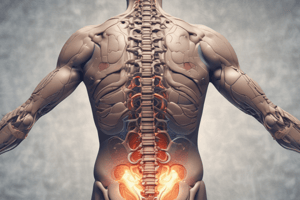Podcast
Questions and Answers
What is the primary condition that defines shock?
What is the primary condition that defines shock?
- Increased cardiac output due to stress
- Excessive blood flow leading to organ damage
- Inadequate oxygen delivery to peripheral tissues (correct)
- Temporary elevation of blood pressure
Which of the following is NOT a type of shock?
Which of the following is NOT a type of shock?
- Hypovolemic shock
- Vascular shock (correct)
- Cardiogenic shock
- Distributive shock
What primarily causes cardiogenic shock?
What primarily causes cardiogenic shock?
- Severe blood loss
- Impaired cardiac function (correct)
- Vasodilation due to infection
- Fluid loss through diarrhea
Which type of shock is specifically associated with infections?
Which type of shock is specifically associated with infections?
What physiological response occurs during shock to protect vital organs?
What physiological response occurs during shock to protect vital organs?
Flashcards
Shock: Definition
Shock: Definition
A life-threatening condition where the circulatory system fails to deliver oxygen and nutrients to tissues, and remove waste.
Types of Shock: Hypovolemic
Types of Shock: Hypovolemic
Shock caused by a sudden drop in blood volume, often due to fluid loss (e.g., bleeding, burns).
Cardiogenic Shock
Cardiogenic Shock
Shock due to the heart's inability to pump effectively, often from a heart attack.
Distributive Shock: Septic
Distributive Shock: Septic
Signup and view all the flashcards
Shock Consequences
Shock Consequences
Signup and view all the flashcards
Study Notes
Shock: A Life-Threatening Condition
- Shock is a life-threatening condition where the circulatory system fails to deliver oxygen and nutrients and remove waste products from the body. It's a condition described by a range of symptoms.
- Untreated shock can rapidly lead to organ failure and death.
- Shock is defined as inadequate oxygen delivery to tissues, causing lactic acidosis, cellular hypoxia, and metabolic disruption.
- It's categorized into hypovolemic, cardiogenic, and distributive shock.
Types of Shock
- Hypovolemic Shock: Reduced oxygen delivery due to decreased blood volume. Causes include: hemorrhage, burns, diarrhea, and fluid shifts.
- Cardiogenic Shock: Impaired cardiac function causing decreased oxygen delivery. Often a result of myocardial infarction (heart attack).
- Distributive Shock: Further sub-categorized into:
- Septic Shock: Systemic response to infection, often associated with gram-negative or gram-positive bacterial sepsis.
- Neurogenic Shock: Disruption of the sympathetic nervous system (e.g., spinal cord injury, pain).
- Anaphylactic Shock: Allergic reaction.
Symptoms of Shock
- General symptoms include hypotension, reduced tissue perfusion, tachycardia, weak pulse, narrow pulse pressure, cold extremities (except septic shock), sweating, anxiety, breathlessness, and confusion/unconsciousness.
Physiological Response to Shock
- The body's circulatory response prioritizes vital organ perfusion (heart and brain) over other areas.
- Progressive vasoconstriction of non-vital areas can lead to organ damage like renal cortical necrosis.
- Untreated shock creates a damaging cycle of hypoxia and acidosis.
Treatment of Shock
- General Management: Prioritize airway, breathing, and circulation. Stop bleeding. Administer fluids (preferably crystalloids). Position head down. Treat the underlying cause.
- Hypovolemic Shock: Fluid and blood replacement are crucial.
- Septic Shock: Antibiotics (especially against gram-negative microbes), inotropic support (e.g., adrenaline, dopamine), and surgical removal of infection focus.
- Cardiogenic Shock: Inotropes, treatment of cause.
- Neurogenic Shock: Pain relief, and treatment of the underlying cause and supportive measures.
- Monitoring: Crucial to assess resuscitation success by monitoring urine output, blood pressure, and pulse.
Complications of Severe Shock
- Shock lung (ARDS)
- Acute renal failure
- Gastrointestinal ulceration
- Disseminated intravascular clotting
- Multi-organ failure
- Death
Studying That Suits You
Use AI to generate personalized quizzes and flashcards to suit your learning preferences.




